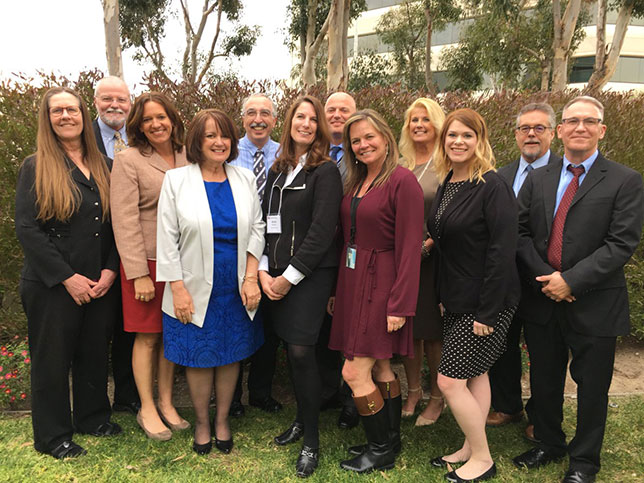OER for Workforce Development
SkillsCommons provides a massive but navigable repository for the workforce development pipeline — supporting programs with affordable, openly licensed training and education materials.
Category: Teaching and Learning
Institution: California State University
Project: SkillsCommons
Project lead: Gerard Hanley, assistant vice chancellor, MERLOT executive director, and SkillsCommons director
Tech lineup: Atmire, Blackboard, Microburst Learning

SkillsCommons team
SkillsCommons is an enormous repository of free and open source workforce development training and education materials. By storing quality, vetted materials, it allows those working in workforce development programs to identify and use relevant open education resources (OER) — everything from individual assignments to entire learning programs — through open licensing agreements.
Ambitious work on the repository and its functional features started in 2013 under California State University and MERLOT, led by CSU assistant vice chancellor Gerry Hanley as SkillsCommons director. Also executive director of MERLOT for many years, Hanley brings inspiration and values from that project to the design and operation of SkillsCommons. The repository is now considered the biggest collection of its type in the world, created with nearly $2 billion in grants from the Trade Adjustment Assistance for Community Colleges and Career Training (TAACCCT) program, an initiative out of the U.S. Departments of Labor and Education that funded 700 education institutions in all 50 states to create or redesign workforce development.
SkillsCommons currently serves more than 180,000 users and has had more than 1.6 million downloads to date, including e-textbooks, complete online and hybrid courses, supplemental materials, simulations, work-based learning and apprenticeship support pieces, program management documents and much more.
The SkillsCommons staff anticipated the need for user support and tools to navigate the vast repository effectively. They were on hand to respond to user needs and develop new, thoughtful features and functions, which they rolled out as the repository matured over time. For example:
- SkillsCommons Showcases are models of especially high-quality materials developed by education and industry experts;
- A Support Center allows users to build on open licensing, learn about accessibility tools and gain an understanding of the SkillsCommons quality assurance measures; and
- A Connect Center provides users with community-building options such as storytelling tools, onboarding for industry experts who may be new to the classroom, and connections to technology design partners. The Connect Center proactively supports community college innovations in workforce development.
SkillsCommons is used in all states throughout the U.S. and in 217 countries. Evidence shows that supporting workforce development programs with the availability of affordable, openly licensed materials is leading to redesigned workforce development programs, a better-prepared workforce and greater opportunities in all occupational areas.
A repository the size of SkillsCommons must of course be built on a stable technology platform and use mature tools for data management, development and delivery. Flexibility was an important factor, especially for long-term goals.
SkillsCommons partnered with DSpace contractor Atmire for managed hosting support, including the ongoing maintenance of DSpace on Amazon's EC2 Web Services Platform (AWS). AWS is important for streaming large audio and video files — a growing area for SkillsCommons. CSU staff developed a custom DSpace interface for SkillsCommons. And staff met the unique requirements of SkillsCommons by working with the U.S. Department of Labor on the schema and set of controlled vocabularies to support the cataloging of learning objects. The CSU team also developed information and support pages in conjunction with training and support activities and documentation.
Once SkillsCommons was in place, it was not long before developers took steps to move it even further beyond a basic storage and management solution, integrating it into a widening set of systems and services. They integrated DSpace into MERLOT such that all objects would be discoverable and usable within MERLOT. DSpace exposes object metadata to MERLOT using the OAI protocol for metadata harvesting (OAI-PMH). They also enabled post-processing of complex data files so that the Blackboard learning management system could process course exports and other compound objects, while also making the objects' constituent parts discoverable individually.
In another interesting move, SkillsCommons contracted with Microburst Learning to "make over" a faculty orientation course that was submitted to the repository. The makeover version is titled "Jumpstart to Successful Instruction" — which led to the creation of a new community within the SkillsCommons Connect Center. The purpose of the "Jumpstart to Successful Instruction: IE2EI" community is to support workforce development programs across all industry sectors, preparing industry experts to become excellent teachers.
The SkillsCommons repository is helping to update current practices in higher education and industry training. Change takes time, of course, but the successes and benefits of SkillsCommons have already proven to be far reaching and continue to validate and propel the work of the SkillsCommons project.
Return to Campus Technology Impact Awards Home